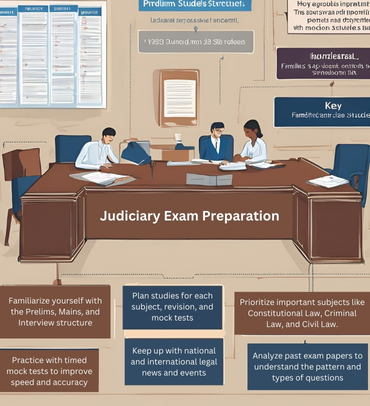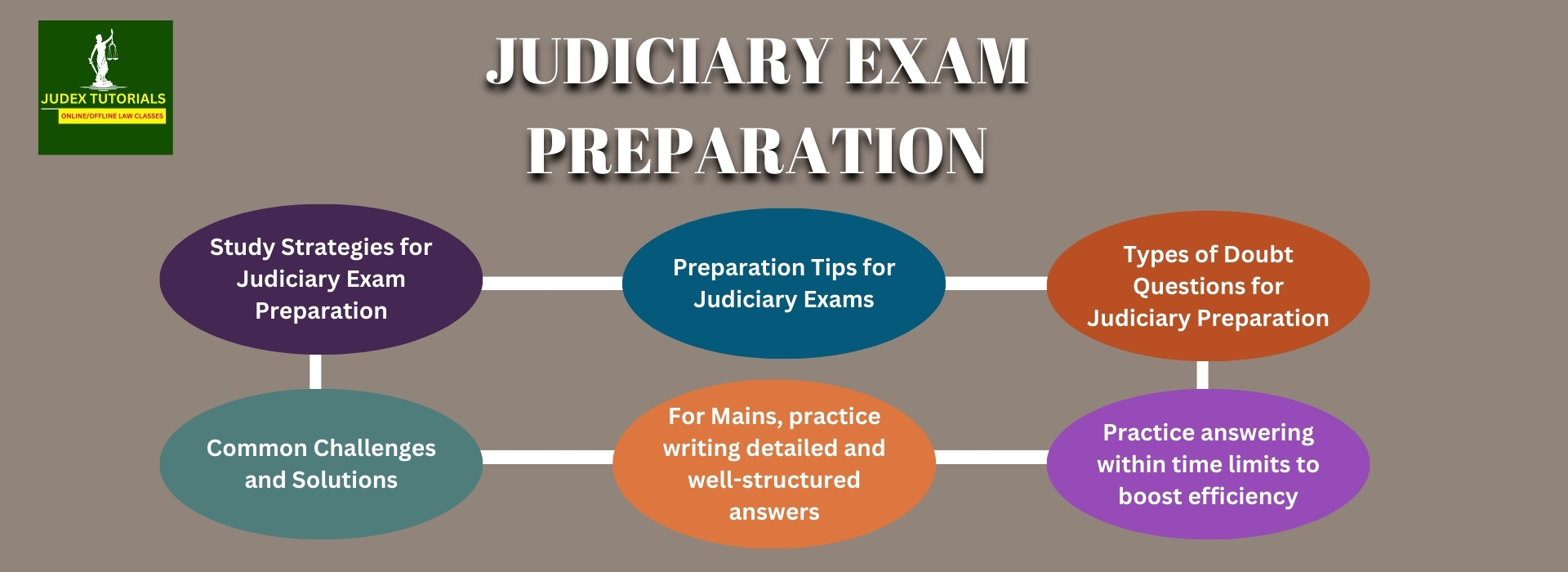.jpg)
Judicial Services Exam Preparation in Patna Bihar
Judiciary exam preparation is a journey that requires consistent effort, focus, and a smart study approach. Whether you're aiming for civil judge exams or state-level judicial services, having a solid plan can make a significant difference. Here is a quick guide to get you started, followed by essential strategies and tips to help you ace your preparation:
- Setting Clear Goals: Begin by familiarizing yourself with the exam syllabus and requirements. Breaking down the syllabus into daily study goals ensures steady progress and prevents last-minute cramming.
- Effective Study Techniques: Judiciary exams are rigorous, testing not only your legal knowledge but also application skills. Methods like taking mock tests, practicing previous years' papers, and focusing on high-priority topics can streamline your prep.
With that foundation in mind, here are some strategies and tips to help you excel in your judiciary exam preparation. From time management to core topics, this guide covers all the essentials for your journey to becoming a judge.

1. Study Strategies for Judiciary Exam Preparation
- Comprehensive Syllabus Understanding: Review the entire syllabus, including core and optional subjects, to identify high-yield areas. Prioritize important sections like the Indian Penal Code (IPC), Constitution, and Evidence Act.
- Time Management: Break down your study time by dividing it between reading, revising, and practicing. Use a study schedule to allot specific time slots for each subject.
- Effective Note-Making: Create concise notes during your study sessions to aid in quick revisions, especially for lengthy acts and complex sections.
- Daily Study Goals: Set achievable daily targets to stay consistent, tracking your progress weekly to ensure full syllabus coverage before the exam date.
- Concept Clarity: Focus on understanding the concepts, as judiciary exams often test comprehension and application rather than rote memorization.
2. Preparation Tips for Judiciary Exams
- Mock Tests: Take regular mock tests to practice time management and identify weak areas. Mock tests can simulate exam conditions, helping build speed and accuracy.
- Previous Year Papers: Solve past years' papers to familiarize yourself with question patterns, formats, and frequently covered topics. Analyze these to understand the weightage of different sections.
- Group Studies or Discussions: Join study groups or participate in discussions with fellow aspirants. Explaining topics to others can enhance your understanding.
- Legal Updates: Judiciary exams often ask about recent judgments or amendments, so stay updated with current legal developments.
- Revision Cycles: Schedule regular revisions; plan for at least 3-4 rounds before the exam. Use tools like flashcards or summary sheets for last-minute prep. We are the best coaching for judicial services in Patna Bihar.
3. Types of Doubt Questions for Judiciary Preparation
- Legal Terminology: Many students find it challenging to grasp legal terms and concepts, so make a glossary of key terms.
- Application of Laws: Questions often involve the practical application of law, especially in hypothetical scenarios.
- Procedural Differences: Understanding differences between procedures in criminal law (e.g., arrest, bail, evidence) and civil law (e.g., filing, decree execution).
- Complex Sections: Some sections, such as those in the Evidence Act, can be confusing. Preparing these with practical examples can help.
- Comparative Analysis: Distinguishing between similar legal provisions, like the difference between negligence and strict liability.
4. Common Challenges and Solutions
- Retention of Large Content: Use mnemonics, summaries, and flowcharts to simplify complex topics. Repetitive revision also helps with retention.
- Answer Writing Practice: Practice writing clear, concise answers. Judiciary exams often test the ability to explain complex legal topics briefly.
- Handling Pressure: Exam stress is common. Practice meditation, take breaks, and maintain a balanced schedule to reduce anxiety.
- Mock Interviews for Viva: Many judiciary exams include interviews. Regular mock interviews help boost confidence and improve answer presentation.
5. Important Judiciary Exam Preparation Topics
- Criminal Law: Focus on IPC sections related to criminal liability, offenses, and criminal procedures.
- Constitutional Law: Fundamental rights, duties, directive principles, and landmark judgments.
- Civil Law: Civil Procedure Code, transfer of property, contracts, and torts.
- Evidence Law: Sections on admissibility, relevance, and examination of witnesses.
- Local Laws: Many judiciary exams include state-specific laws. Prioritize these according to your state's exam pattern.

6. FAQs for Judiciary Exam Aspirants
- How many hours should I study daily?
Most successful candidates study for about 6-8 hours daily, with proper breaks in between. - Are mock tests necessary?
Absolutely. They help identify your weak areas and increase your speed. - What is the right time to start judiciary preparation?
Ideally, one year before the exam, but six months of focused study can also yield results. - How to approach case laws?
Focus on landmark judgments and understand their key points, applications, and impacts. - What books should I use?
Refer to standard books on IPC, CPC, CrPC, Evidence, and relevant guides for each subject.
7. Engaging Content for Social Media
- Quick Revision Tips: Share brief, helpful tips on high-weight sections or important cases.
- Motivational Posts: Encourage aspirants with success stories or quotes related to judiciary exams.
- Infographics on Key Topics: Visual summaries of complex topics, like the stages of a civil or criminal trial.
- Live Q&A Sessions: Engage students with doubt-clearing sessions on social platforms.